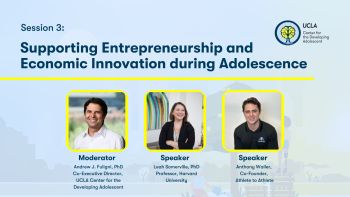Adolescence is a key window when young people are figuring out who they are, trying to make meaning of the world around them, and finding a sense of purpose. It is a great time to engage youth, and provide them with opportunities to develop the skills and gain the experiences they need to thrive as adults.
That’s why with the support of the Annie E. Casey Foundation, we recently created two youth engagement guides—one for practitioners and one for funders. These guides are designed to help youth-serving organizations and those who fund them build the type of meaningful, effective youth engagement programs that help young people succeed.
The authors of those guides joined us for an online panel discussion, moderated by our Co-executive Director Adriana Galván. Panelists included Ahna Suleiman, our Youth National Scientific Council on Adolescence (YNSCA) coordinator, Jeffrey Poirier, Associate Director at The Annie E. Casey Foundation, and Beatriz Lopes and Michael Nguyen, members of the YNSCA.
Using a Developmental Science Framework
Individuals of different ages, cultures, and lived experiences bring different capacities and require different types of support to thrive. Understanding the developmental stage youth are in can help organizations be more precise in their strategies around youth engagement. “We need to engage the right young people at the right time, depending on what our goals are,” said Ahna. “Developmental science adds a really important and critical lens to understanding that.”
Benefits of Youth Engagement
Using a developmental science framework can also help us understand the benefits of youth engagement. For example, youth engagement provides opportunities to increase equity between young people and adults. “Youth engagement is a fundamental human right,” said Ahna. “Everybody should be able to participate and have a say in designing the world that they live in.”
As an example, Beatriz described her experience participating in a youth engagement conference that UCLA CDA hosted last summer. During the event, researchers, youth engagement practitioners, funders and members of our YNSCA met for a day-long meeting dedicated to enhancing youth engagement across programs and policies that serve young people.
“That was a really great experience to not only get to be with the YNSCA in person for learning/activities together, but be able to participate in the conference with adults, funders, practitioners and everyone invited to that conference,” Beatriz said. “I know all of us felt like we were equals in that room, had a say in what was being discussed, and that our opinions were valued.”
Youth engagement not only benefits young people, it benefits organizations and adults as well. Meaningfully engaging youth helps adults to better understand how to work with young people and improve the quality and relevance of organizations’ work. “It’s really important to support and collaborate with young people, who are the experts in their own lives,” said Jeff, describing the work of The Annie E. Casey Foundation.
Engaging Youth Remotely
Intentionally creating strategies based on an understanding of adolescent development can help make programs more engaging for youth, even when they’re not in person. For example, Ahna shared tips for engaging youth remotely, based on her personal experience collaborating with our YNSCA, who often met virtually. “I did a lot of 1-on-1 contact with people before we brought them into the group,” Ahna explained. “That felt really important to me, so that everybody felt like I had a relationship with them before we invited them into a common space to build relationships with one another.”
Panelists shared other tips for engaging with youth remotely, including following the leads of young people by connecting with them on platforms that feel most comfortable and accessible to them. While some youth may prefer Zoom, others may prefer text communication, Google Meet, or other formats.
Available Resources
During the panel, Ahna made an important distinction about youth engagement, “We may know a lot about young people, and a lot of us have a lot of experience serving young people. It’s really different to step alongside them and partner with them.” If you or someone you know is looking for tips on building effective youth engagement programs, you can download our guides on our website.

_(750_×_500_px)_750_500_80_c1.jpg)

